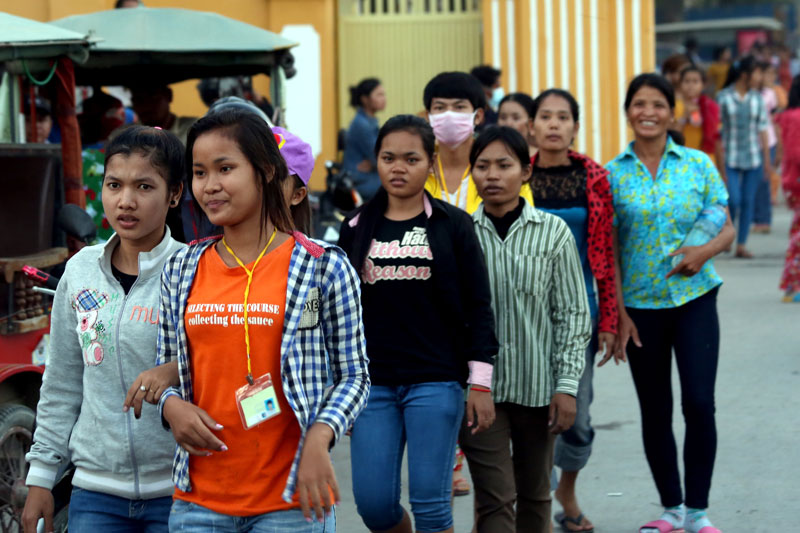Labor unions and garment factory owners gave opposing reports of the scale of an overtime boycott that began Monday as the first phase of a nationwide labor strike planned for next month.
Union leaders estimated that workers refused to work overtime at between 100 and 200 factories, while the Garment Manufacturers Association of Cambodia (GMAC) said that “very, very few” of the country’s more than 400 factories were affected by the industrial action.

“Most factories are working at normal overtime,” said Ken Loo, secretary-general of GMAC. “Only certain factories where these unions have majority of members [are affected]. There are some small pockets here and there.”
“But most factories are not affected,” Mr. Loo added. “This goes to prove what we have said all along, that a minority of workers want to strike and the majority want to work.”
However, Ath Thorn, head of the country’s largest independent union, said that about 25 percent of the country’s exporting garment factories saw workers walk out after eight hours on the job.
“We can estimate that [workers at] about 100 factories boycotted working overtime,” Mr. Thorn said, adding that workers walked out of factories along National Roads 1, 4, 5, 6 and on Veng Sreng Street, where five protesting garment workers were shot dead by military police on January 3.
Mr. Thorn, president of the Coalition of Cambodian Apparel Workers Democratic Union, said that the 18 unions and associations supporting the boycott were still distributing leaflets to inform workers of the overtime boycott and planned strike, which will seek to raise the minimum wage to $160 per month.
“We continue to disseminate this information since there were some factories that still have not received our message,” he said.
Pav Sina, president of the Collective Union of Movement of Workers, estimated that up to 200 factories were affected by the overtime boycott.
Although the country’s labor law stipulates that employees may only work 60 hours per week—12 hours of overtime on top of a 48-hour work week—workers in the garment sector routinely put in longer hours, said Jill Tucker, technical adviser at the International Labor Organization’s Better Factories Cambodia program.
“Sixty hours of work [per] week …is supposed to be the maximum here, but tends to be the average,” Ms. Tucker said, adding that a 60-hour work week is common in garment producing countries.
Dave Welsh, Cambodia program director for the Solidarity Center, a U.S.-based labor organization, said that workers in the garment sector are compelled to work overtime in order to make a living wage.
“The issue isn’t that workers aren’t being paid properly [for overtime],” Mr. Welsh said. “The issue is that because of how fragile the contract system is and because guaranteed wages are not enough to live off of…workers feel compelled to work extraordinarily long hours to make up for poor guaranteed wages.”
Outside the Canadia Industrial Park in Pur Senchey district on Monday, workers were mixed in their attitudes toward the overtime boycott. A worker who gave her name only as Pha, 40, said that she was forgoing working overtime, which usually adds up to about $30 in extra income each month on top of her base salary of $100.
“We have worked for many years, but we only have our empty hands,” she said. “Therefore, we need to strike to demand an increase in our payment.”
Srey Mao, 20, a worker at I Apparel Ltd., said that all of about 500 workers at her factory were taking part in the boycott.
“All workers in my factory are not working overtime because they want the government to release the 21 prisoners,” she said.
“We are not concerned about losing our overtime payment since we have to sacrifice this payment to get our higher salary.”
However, Chan Thy, 30, said that workers at the Noble Apparel Ltd. factory, where she is employed, decided to work overtime after management warned them against following the unions.
“They told us the factory will be shut when workers join the strike and not to believe the unions’ leaflets because the incitement will affect workers,” she said.
“If we join the strike, who will give us money while we are striking?” Ms. Thy asked.




